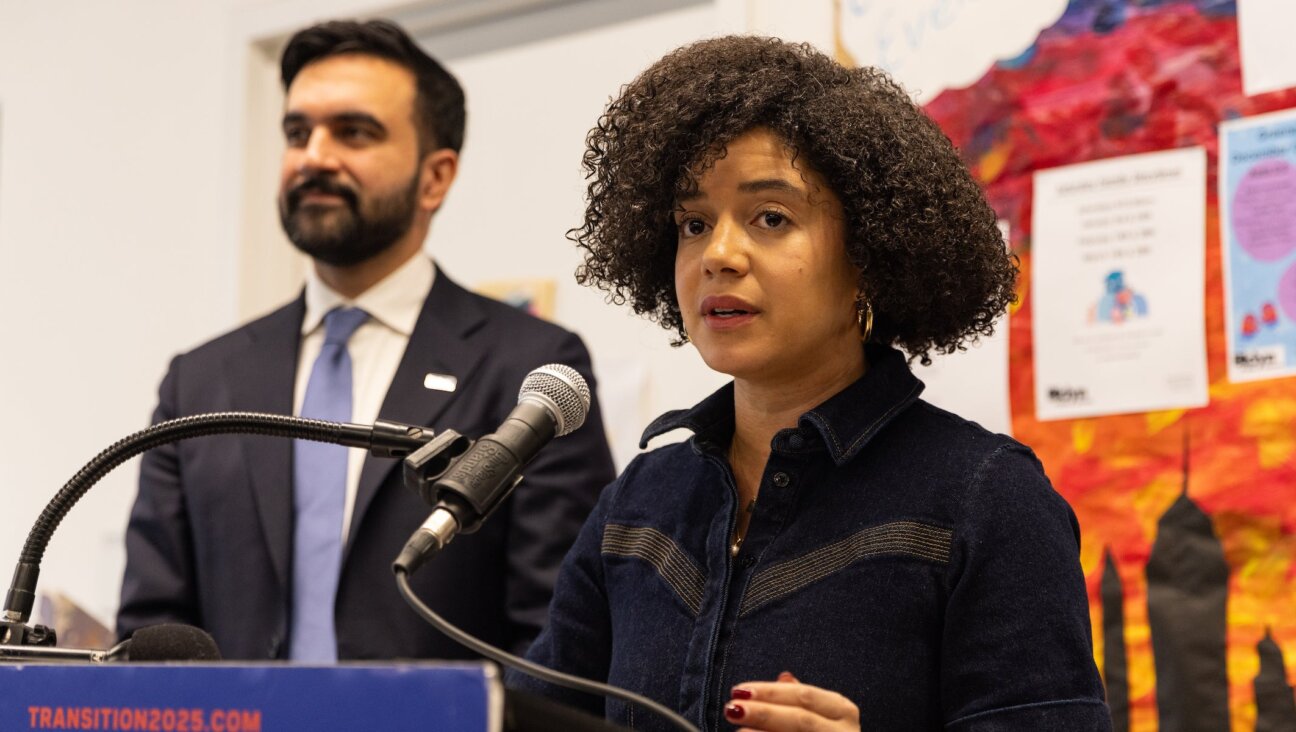Is BDS Hate Speech?

Graphic by Angelie Zaslavsky
When the national director of the Anti-Defamation League takes out a large advertisement in the print edition of The New York Times, you kind of have to take notice. Given the cost of such an ad (surely more than one in the Forward!), the February 7 statement by Abraham Foxman signals that his organization believes the movement to boycott, divest from and sanction Israel — known as BDS — is anti-Semitic hate speech that poses a real and potent threat to Jews everywhere. It is an assertion that you hear repeated by those trying to keep BDS sympathizers far outside the acceptable perimeters of the Jewish communal tent. Are they right? Yes and no.
The occasion for Foxman’s statement was a program held that evening at Brooklyn College, featuring Omar Barghouti, co-founder of the international BDS movement, and Judith Butler, a philosopher at University of California, Berkeley, and outspoken BDS supporter. Foxman said that his complaint wasn’t with the speakers, per se; it was with the fact that the publicly funded college’s political science department sponsored their talk. Such a sponsorship “inherently creates the perception that the views expressed at the event are endorsed by the sponsor… [affording] an added degree of legitimacy and credibility than is unwarranted,” Foxman wrote.
At issue here was not a question of free speech, as some claimed, but whether “sponsorship” amounted to an explicit endorsement of a radical political movement by college professors, the same people who are then entrusted with teaching students in what is supposed to be an open, intellectually honest environment. The ADL is right to challenge such arrangements in Brooklyn or anywhere. As it turns out, Brooklyn College’s administration also did the right thing by making it clear that this event did not mean it was endorsing BDS.
But if BDS is “hate speech,” should it be the subject of public conversation at all?
Here is where Foxman and others who wish to characterize this movement have put themselves into an intellectual bind. So, we might add, have supporters of BDS.
The argument that BDS is hate speech and, at its very core, anti-Semitic stems from the movement’s support of the Palestinian right of return, which Foxman describes as “the destruction of the Jewish state through demography.”
It’s an understandable leap in one sense: If every Palestinian who still lives in a refugee camp was to return en masse to the homes from which they or their families voluntarily fled or were forced to evacuate when Israel was founded in 1948, they would displace the Jewish majority and put an end to the Zionist enterprise. But the “right of return” is a loaded phrase. It is endorsed by United Nations resolutions and international law, upheld (still) by the Palestinian Authority, and open to interpretation by those who don’t want the end of Israel but do argue for some sort of compensation for Palestinians who have been displaced for more than six decades.
Is that hateful? Racist? Actionable? Not necessarily. One can understand why Palestinians cling to their “right of return” as legitimating their historic narrative and communal grievances much as Jews maintain the “law of return” to justify their presence in ancestral land — including, in the case of the West Bank, land that international law claims is reserved for another people.
Deciding whether promoting BDS amounts to hate speech is further complicated by the way the movement itself obscures and manipulates its goals. For some, no doubt, it is a legitimate use of conventional nonviolent tactics to force Israel to end the occupation of Palestinian lands. In that sense, one wishes the Palestinians had foresworn violence and started this years ago. But for others — Barghouti among them — the movement uses “occupation” to describe not just Ramallah, but Ramat Aviv, denying Jews the right to national sovereignty that every other people on earth enjoy, or should enjoy (Palestinians included.)
Using that frame, BDS is essentially biased against Jews. It relies on a double standard by saying that Israel alone is at fault for the continued confict, as if Palestinians share absolutely no responsibility for years of terrorism, denial and mismanagement of their own people’s aspirations. And by calling for a boycott of Israel as a whole, including its academics and thought leaders, proponents of BDS engage in the very act they condemn in others. If that’s not hypocrisy, what is?
In the end, though, we have to ask: What does it matter? Even speech that is biased, hypocritical or hateful should not be censored but instead countered with more and better speech. This is the American value, the Jewish value — a value that is not practiced in other parts of Israel’s tough geopolitical neighborhood, which is all the more reason for the Jewish community here to uphold it rigorously.
The BDS movement’s attempts to create a foothold on college campuses around the country should be monitored and, when necessary, countered. But turning it into a cause célèbre for outside individuals and groups just feeds the media beast and heightens its exposure. A better model is the reaction to a BDS conference held at the University of Pennsylvania last year — with quiet, affirmative programming by the campus Hillel and overall disinterest from everyone else. Universities should model neutrality and restraint in the face of controversial, even onerous, ideas. The rest of us should just model restraint.
















